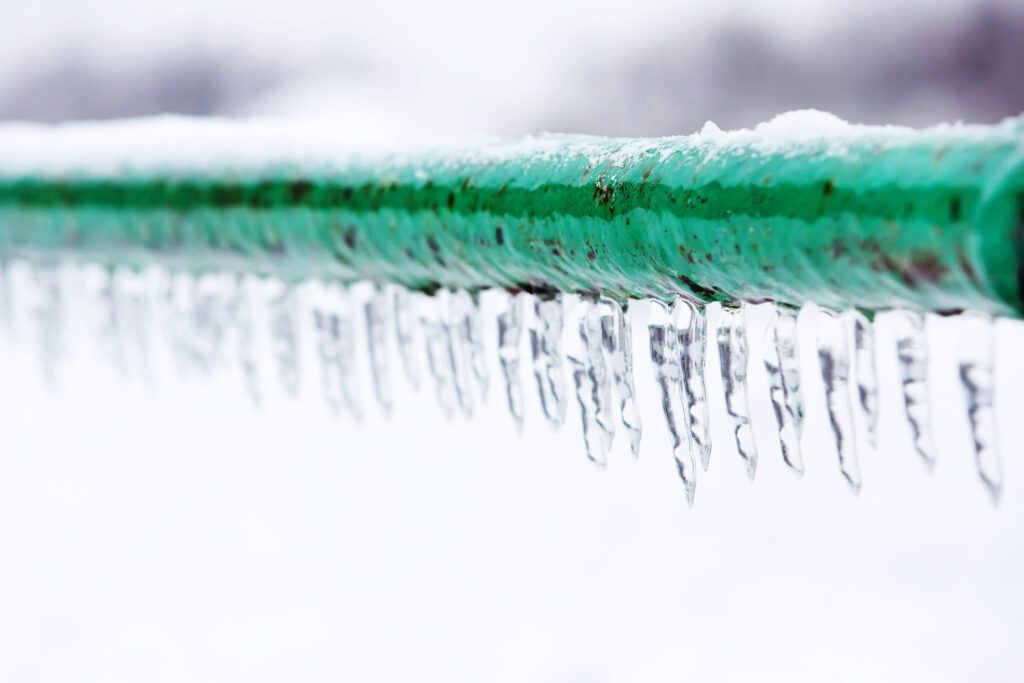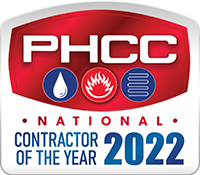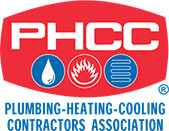
Frozen pipes can be a disaster for your home if handled improperly, destroying your plumbing and exposing you to serious water damage. That’s why it’s important to take every step possible to prevent freezing, act quickly if they do freeze, and know when to call a professional.
Follow these steps if you have frozen pipes in your home:
Turn Off the Main Water Shut-Off Valve
When dealing with frozen pipes, what you should do with your water main shut-off valve depends on the situation. You don’t want to cut off your water main if your pipes are frozen because you need water flow and pressure relief to avoid damage — but if your pipes burst, shutting off the valve can protect you from water damage and more plumbing trouble.
Your water main shut-off valve will be listed in your property inspection report if you have it at hand, but otherwise, you’ll want to check common locations like your basement near the street-side wall of your home, near your water heater, or in your garage. You might also be able to access a shut-off valve where the city line gives way to your water line outside of your home.
Turn On Your Faucets
When water freezes, it expands — if it freezes in tightly sealed plumbing pipes, the pressure forces the material to expand, causing burst pipes.
That’s why we recommend that you leave faucets dripping when you have a risk of frozen pipes. Moving water is less likely to freeze.
If your pipes are already frozen, turning on your faucet will help relieve pressure in your pipes.
Apply Heat to Your Pipes
A hair dryer, space heater, or hot towels can be great ways to thaw exposed pipes. Don’t use an open flame, as this can damage your pipes and seals and lead to more trouble than you were already facing. If your pipe is too hot to touch, try a more gradual, safer warming method.
Even though metal pipes conduct heat well, it can still take hours to fully thaw a fully frozen pipe. Using something like a space heater that doesn’t require as much work to thaw your pipes is best.
Call an Emergency Plumber if Your Pipes Burst
If your pipes aren’t thawing out or you notice water stains or low water pressure after they freeze, it’s important to get a plumber to your home as quickly as possible.
Be sure to shut off power at your electrical panel if you notice standing water to prevent electrical hazards. You might also retrieve belongings in the area if you’re dealing with a major leak.
Prevent Frozen Pipes in the Future
The easiest way to prevent burst pipes is to prevent frozen pipes. Take these measures to protect your plumbing in the future:
- Turn on your faucets to a slight drip whenever temperatures dip below freezing.
- Open the cabinets under sinks if temperatures are below 32 degrees to promote air circulation.
- Shield exposed pipes in your garage and under your home from the cold by insulating them, closing your garage doors, sealing up your crawl space, etc.
- Turn off your water shut-off valve if you’re leaving for vacation.
- Keep your thermostat above 55 degrees, even when your house is empty during the day.
- Winterize your hose bibbs since you don’t use them in the winter.
Call UAT for Pipe Repair or Replacement in Baltimore
If your pipes freeze or burst in the Baltimore area, don’t panic — the team at United Air Temp is always available to help, with 24/7 emergency plumbing services available.
We can quickly find and resolve hidden leaks to minimize water damage to your home. The sooner you act, the better off you’ll be.
Call (410) 413-3549 now to request frozen or burst pipe repair or replacement in the Baltimore area!


















